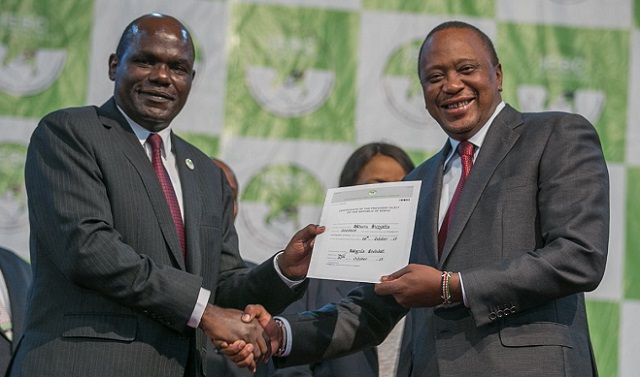
Nairobi, Kenya | AFP | Uhuru Kenyatta, who won a second and final term in Kenya’s controversial election re-run, is the son of the country’s founding president and a man who epitomises the country’s elite.
The 56-year-old US-educated multi-millionaire, whose family owns an array of businesses, properties and land, followed in his father’s footsteps when he defeated his rival Raila Odinga to become president in 2013.
Their rematch in August was again won by Kenyatta, with 54 percent of the vote, but the Supreme Court annulled the results due to “irregularities” and ordered a re-run.
Kenyatta accepted the judges’ ruling but with anger, calling the judges “crooks” and threatening to “fix” the courts if he won Thursday’s vote, which fell on his birthday.
Two weeks before the vote, Odinga announced he would not participate, claiming it would not be free and fair, urging his followers to observe a boycott, which they did en masse with mass protests blocking polling in four of Kenya’s 47 counties.
His withdrawal handed Kenyatta a landslide victory, in which he took 98 percent of the vote.
But it was something of a Pyrrhic victory, with only 38.8 percent of registered voters casting their ballots. Observers warn the result is likely to face a host of new legal challenges — a fact acknowledged by Kenyatta himself.
In his victory speech, Kenyatta made a telling admission, saying that accepting the court’s ruling overturning was “a very difficult and painful decision”. And he said he would be prepared to do the same again.
“My victory today is just part of a process that is likely to once again be subjected to a constitutional test through our courts, and as I have demonstrated repeatedly, I will submit to this constitutional path, no matter its outcomes.”
– Privilege and wealth –
Kenyatta’s first term has been defined by big spending on eye-catching infrastructure and impressive economic growth in a tough climate.
But this has gone hand-in-hand with spiralling debt and widening inequality.
Terrorism has also been a consistent threat, with Kenyatta forced to address the nation in doleful terms after bloody attacks in 2013 and 2015.
The former finance minister and deputy prime minister was born in 1961, shortly after his father Jomo Kenyatta was released from nearly a decade in British jails and before becoming Kenya’s first president in 1964.
His first name means “freedom” in Kiswahili.
Educated at a private school in Nairobi and at Amherst College in the United States, Kenyatta is regarded as a leader of the Kikuyu people, the country’s single largest ethnic group.
 The Independent Uganda: You get the Truth we Pay the Price
The Independent Uganda: You get the Truth we Pay the Price



